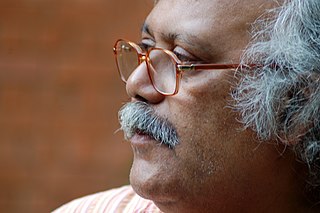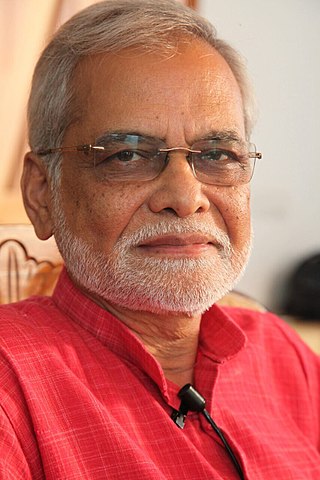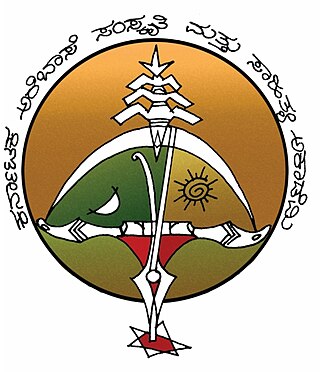
Dattātreya Rāmachandra Bēndre, popularly known as Da Rā Bēndre, is generally considered the greatest Kannada lyric poet of the 20th century and one of the greatest poets in the history of Kannada literature. A pioneering poet of Kannada's Navōdaya movement and a leading figure in the linguistic renaissance of Kannada in the region of North Karnataka, Bendre forged a new path in Kannada literature and modern Kannada poetry through his original use of desi Kannada, particularly Dharwad Kannada – the form of Kannada spoken in the North Karnataka region of Dharwad. The richness, originality, and euphony of his poetry, his preternatural feel for the Kannada language, and his charismatic personality would result in him being hailed as a Varakavi by the Kannada people. In a poetic journey that spanned almost 70 years, Bendre engaged continuously in what he called Kāvyōdyōga or 'The High Yoga of Poetry'.

Vinayaka Krishna Gokak, abbreviated in Kannada as Vi. Kru. Gokak, was an Indian writer in the Kannada language and a scholar of English and Kannada literatures. He was the fifth writer to be honoured with the Jnanpith Award in 1990 for Kannada language, for his epic Bharatha Sindhu Rashmi. Bharatha Sindhu Rashmi deals with the Vedic age and is perhaps the longest epic narrative in any language in the 20th century. In 1961, Gokak was awarded the Padma Shri from the Government of India for Dyava Prithvi.

Purohita Thirunarayanaiyengar Narasimhachar, commonly known as PuTiNa, was a playwright and poet in the Kannada language. Along with, Kuvempu and D. R. Bendre, he forms the well-known trio of Kannada Navodaya poets. He was a Sahitya Akademi fellow and the winner of the Pampa Award, awarded by the Government of Karnataka in 1991.

Palya Lankesh was an Indian poet, fiction writer, playwright, translator, screenplay writer and journalist who wrote in the Kannada language. He was also an award-winning film director.

Kuppali Puttappa Poornachandra Tejaswi was a prominent Indian writer and novelist in Kannada. He also worked as a photographer, publisher, painter, naturalist, and environmentalist. He made a great impression in the Navya ("new") period of Kannada literature and inaugurated the Bandaaya Saahitya genre of protest literature with his short-story collection Abachoorina Post Offisu. He is the son of noted Kannada poet Kuvempu.
Panchakshari Hiremath is a writer and poet, short story writer, essayist, critic, translator, orator, editor and freedom fighter who writes in Kannada, Urdu and Hindi. In 2005, he won the Sahitya Akademi Prize for Translation.

Chandrashekhara Basavanneppa Kambara is a prominent Indian poet, playwright, folklorist, film director in Kannada language and the founder-vice-chancellor of Kannada University in Hampi also president of the Sahitya Akademi, country's premier literary institution, after Vinayak Krishna Gokak (1983) and U.R. Ananthamurthy (1993). He is known for effective adaptation of the North Karnataka dialect of the Kannada language in his plays, and poems, in a similar style as in the works of D.R. Bendre.
L. Gundappa (1903-1986) was a distinguished professor of Kannada literature at Bangalore University who played a pivotal role in the revival of Kannada literature. Inspired by his mentor, B. M. Srikantaiah, Gundappa made significant contributions to the field, particularly in the areas of translation and promoting world literature to Kannada readers.

Hulkuntemath Shivamurthy Sastri Shivaprakash is a leading poet and playwright writing in Kannada. He is professor at the School of Arts and Aesthetics, Jawaharlal Nehru University, New Delhi. He heads the Cultural Centre at Berlin, known as the Tagore Centre, as Director run by Indian Council for Cultural Relations (ICCR). He has seven anthologies of poems, twelve plays, and several other books to his credit. His works have been widely translated into English, French, Italian, Spanish, German, Polish, Hindi, Malayalam, Marathi, Tamil and Telugu. His plays have been performed in Kannada, Hindi, Meitei, Rabha, Assamese, Bodo, Tamil and Malayalam. Shivaprakash is also a well-known authority on vachana literature, Bhakti movements of India, and Sufi and other mystic traditions.

Jagannatha Dasa (1728–1809), a native of Manvi town in the Raichur district, Karnataka state, India, comes in the preceptorial line of Madhvacharya and is considered one of the notable Haridasa of Dvaita Vedanta of Madhva saint-poets of the Kannada language. He was a pupil of the great Sri Varadendra Tirtha.

Sumathendra Raghavendra Nadig was an Indian professor and writer in Kannada. Nadig came upon the literary scene as a prominent modern poet in the 1960s. He was a close associate of Gopalakrishna Adiga, the leader of the modernist movement.

Khaleel ur Rehman from the Indian state of Karnataka, is better known by his pen name Khaleel Mamoon is a noted Urdu poet whose poetry collection Aafaaq ki Taraf won the 2011 Sahitya Akademi Award for works in Urdu.
Balaji Tangali Lalitha Naik is an Indian social activist, politician, writer, film actress who was the minister of Kannada, Culture, and Department of Women & Child Welfare of Karnataka. Naik has also served as an MLC (1986-1992) and MLA (1994-1999). She won the Karnataka Sahitya Academy Award in 1991. She is also known for leading important literary, social and language-rights movements such as Bandaya movement and Gokak agitation.
Nuggehalli Pankaja is an Indian writer and poet in the Kannada and English languages. She is considered one of the notable writers in the Kannada language. Her works include novels, short stories, and plays. She was conferred the Excellence in World Poetry Award by the International Academy for English Poetry. Some of her novels have been made into movies in Kannada.

Aravind Malagatti is a prominent Indian poet and writer in Kannada-language. He is the author of more than forty books which include poetry collections, short fiction collections, a novel, essay-collections, critical works and folklore studies. He is the recipient of the prestigious Ambedkar Fellowship Award from the Government of Karnataka. His Government Brahamana, the first Dalit autobiography in Kannada, has won the Karnataka Sahitya Academy Award. Apart from these, the Honorary Award of Karnataka Sahitya Academy was conferred on him for his total contribution to Kannada literature. He is appointed as Chairman for Kannada Sahitya Academy.

Mudnakudu Chinnaswamy is an Indian Kannada language poet, hailing from Mudnakudu village in Chamarajanagar district of Karnataka, India. He received Kendra Sahitya Academy award in 2022, for his work "Bahutvada Bhaaratha mattu Bouddha Thaatvikate".

Karnataka Arebhashe Samskruthi mathu Sahitya Academy is an organization under Government of Karnataka for promotion of literature in Arebhashe language. Established on 15 December 2011 by the Government of Karnataka. The purpose of the academy is to preserve and promote the Arebhashe language, Arebhashe literature, and Arebhashe culture. Which has a considerable population of Arebhashe speakers, a language minority in the state Karnataka and Kerala. Arebhashe is a dialect of Kannada spoken mainly by Gowda and other community in the region of Kodagu, Sullia of Dakshina Kannada in the Indian state of Karnataka as well as Bandadka, Kasaragod District in the Indian state of Kerala. The academy was formed by then Chief Minister D. V. Sadananda Gowda.
Pratibha Nandakumar is an Indian poet, journalist, feminist, columnist and activist who works in Kannada and English. She is considered as one of the pioneers of modern woman's poetry in Kannada literature. For her work Kavadeyaata, Pratibha was awarded the Karnataka Sahitya Akademi Award for Poetry in 1998.

Chidananda Parasappa Siddhashrama, known as CPS or Prof. Siddhashrama, is an Indian academic, writer, critic, and poet who is known for his works in Kannada. He is a retired professor of Mysore University where he served as the acting Vice Chancellor. In 2020, for his contributions to the field of literature, Siddhashrama has been awarded the Karnataka Rajyotsava Award by Government of Karnataka.
Metikurke Ramaswamy Kamala is a writer, and a poet in Kannada language who is a recipient of Karnataka Sahitya Academy award.














